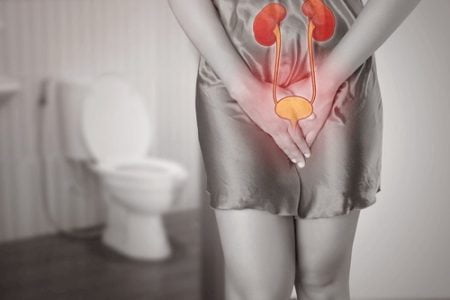Signs and Symptoms of Urinary Tract Infection
- Updated on: Jun 24, 2024
- 3 min Read
- Published on Feb 21, 2021


If you’re a woman, your chances of getting a urinary tract infection (UTI) are higher though people of any age and sex can develop UTI. The symptoms of a urinary tract infection can depend on various factors such as your age, gender, whether you had used some external devices like catheter, and based on the part of the urinary tract that has been infected by UTI. The symptoms of a UTI generally develop over several days and start with little burning sensation when you pee.
Common Symptoms of Urinary Tract Infection
• Pain and Burning: Pain or burning sensation when you pass urine is often the first sign of a bacteria or an infection in the urethra or bladder. However, it does not always mean that you will have a complicated urinary tract infection. If you get the pain or burning just once or twice and then other symptoms do not show up, it is likely that the bacteria has passed in urine and the UTI does not develop further.
• Urine Urge: Strong and persistent urge of urine
• Frequency of Urine: Passing urine frequently and in small amounts
• Smell in Urine: Strong smell in urine: a strong pungent smell is a common symptom of UTI
• Vomiting and nausea
• Abdominal pains: Older women particularly may experience cramping, pressure, or abdominal pains in UTI. In some cases, it may be the most pronounced symptom along with muscle aches and fatigue, according to the National Institute of Diabetes and Digestive and Kidney Diseases.
• Blood in urine
• Pains in Pelvis: Pelvic pain in women particularly in the center of the pelvis and around the pubic bone
• Cloudy or bloody or colored urine: Your urine color can tell a lot of things about the condition. Colored urine is a cause to worry. Cloudy, red, or brown urine can be signs of infections.
UTIs, particularly bladder infection, can cause back pain when they spread. The pain can be indicative of infection in the kidneys. This pain will be persistent regardless of your position or activity unlike typical muscle pains. A kidney infection will also cause fever, nausea, and vomiting. Kidney infections are more serious than bladder infections and require urgent medical attention. If you notice these symptoms, you should immediately contact your doctor.
UTIs are often overlooked or mistaken for other conditions in older adults as the symptoms may be similar to other conditions. People usually ignore these symptoms or attribute them to some other condition, but it is important to be careful about them and discuss them with your doctor. He can help you find the cause better. While a UTI can be very painful and can disturb your daily life, however, these infections are easy to treat.
FAQs
Can urinary tract infections cause lower back pain?
Yes, UTIs can sometimes cause lower back pain, especially if the infection spreads to the kidneys. If you experience such symptoms, seek medical attention promptly.
Are frequent urination and urgency always signs of a UTI?
While frequent urination and urgency are common UTI symptoms, they can also indicate other conditions. Consult a healthcare professional for an accurate diagnosis.
Can UTIs cause blood in the urine (hematuria)?
Yes, hematuria is a potential symptom of UTIs. It's crucial to consult a healthcare provider if you notice blood in your urine for proper evaluation and treatment.
Do UTIs always cause a strong, persistent odor in urine?
Not always. While strong-smelling urine can be a symptom of a UTI, it's not universal. Other factors, such as diet or dehydration, can also influence urine odor.
Can men experience urinary tract infections, and do the symptoms differ?
Yes, men can get UTIs, though they are less common. Symptoms may include pain or discomfort during urination, urgency, and lower abdominal discomfort, similar to women.












